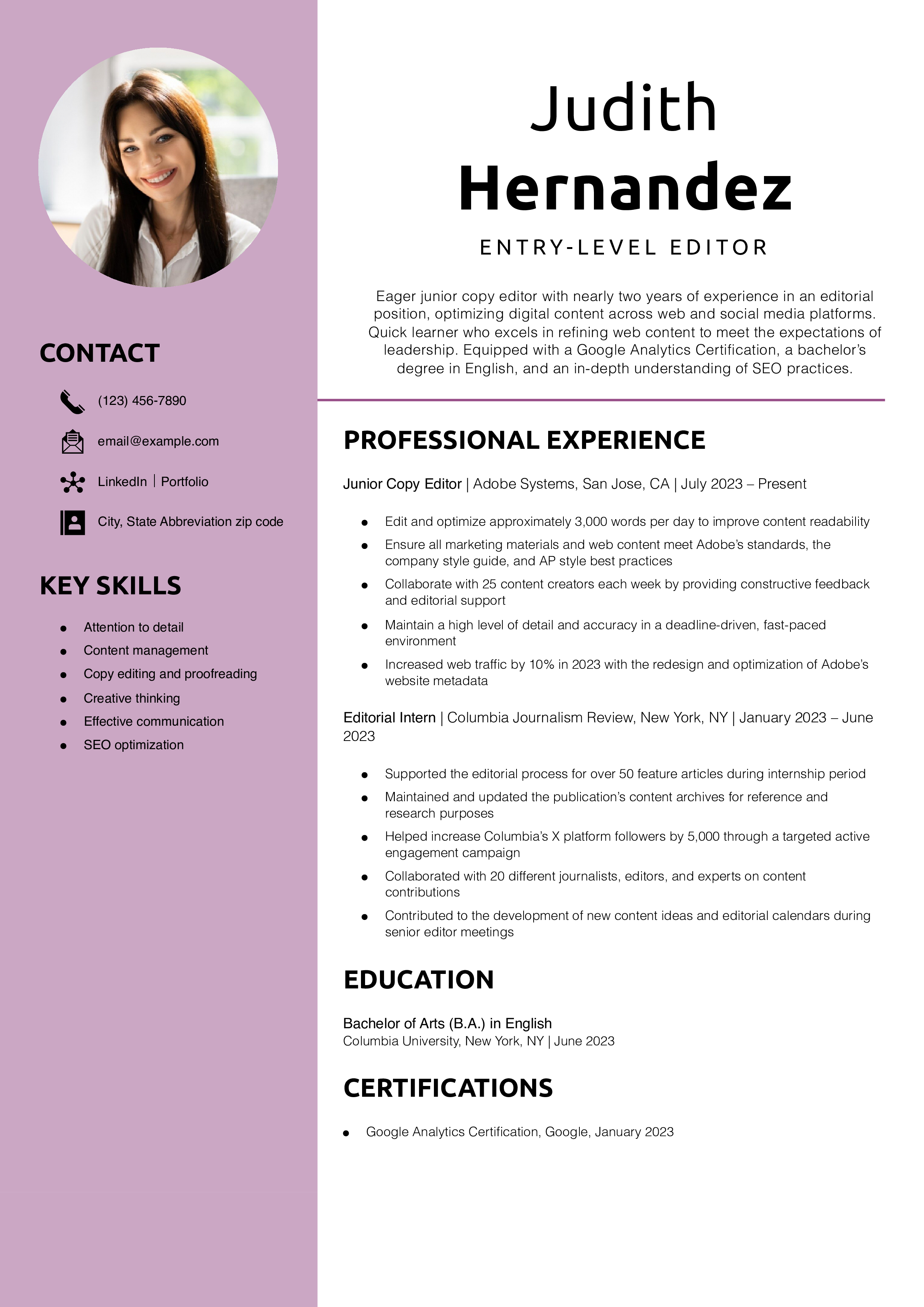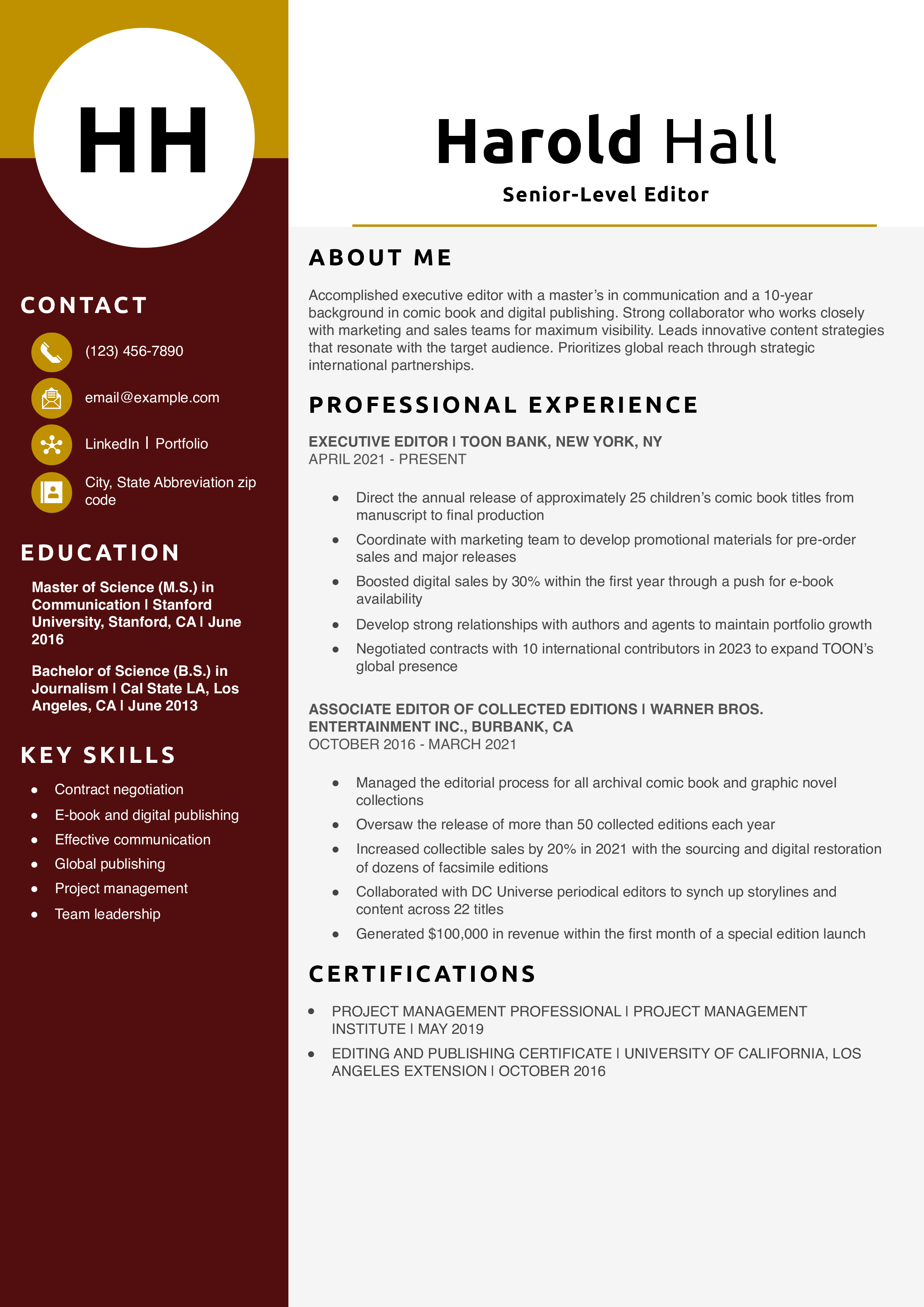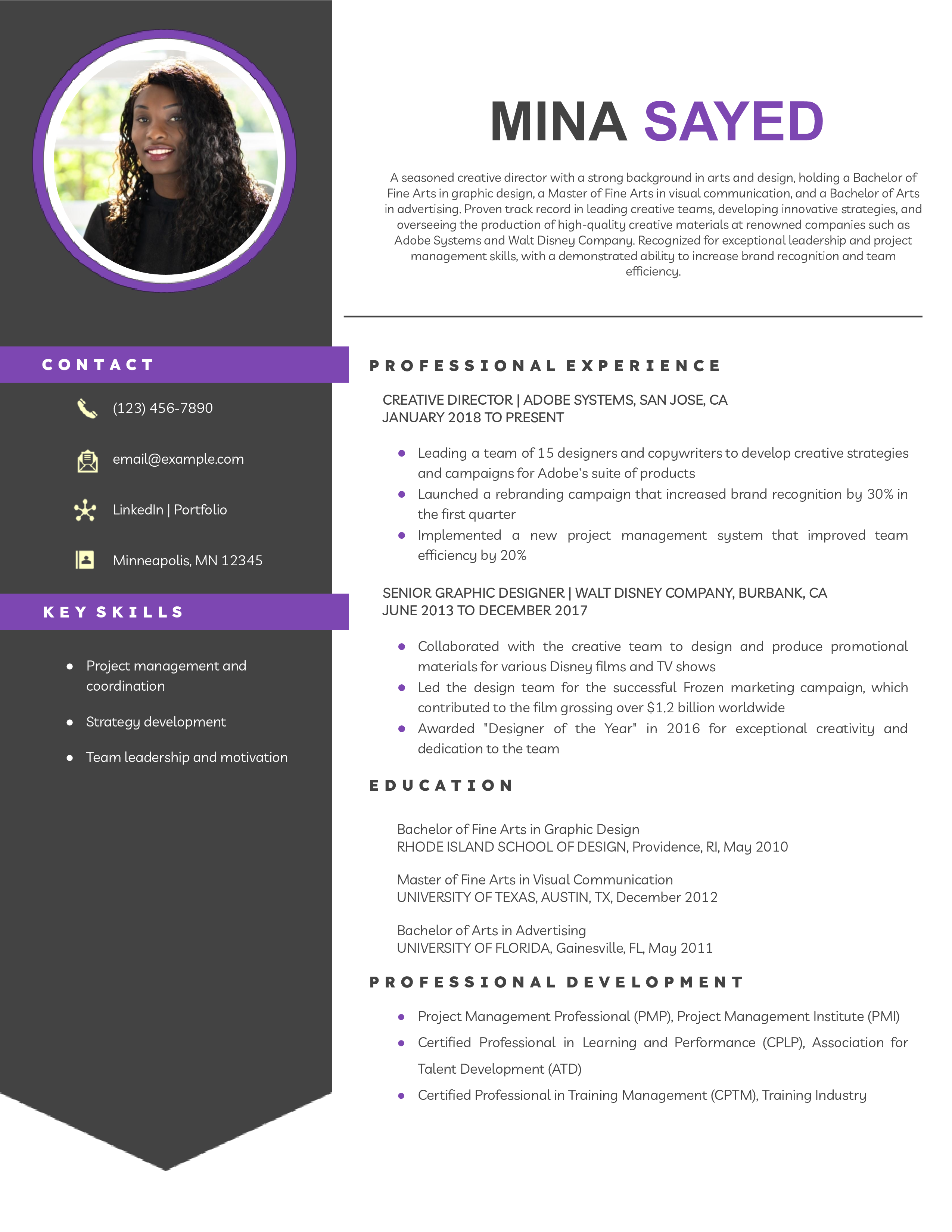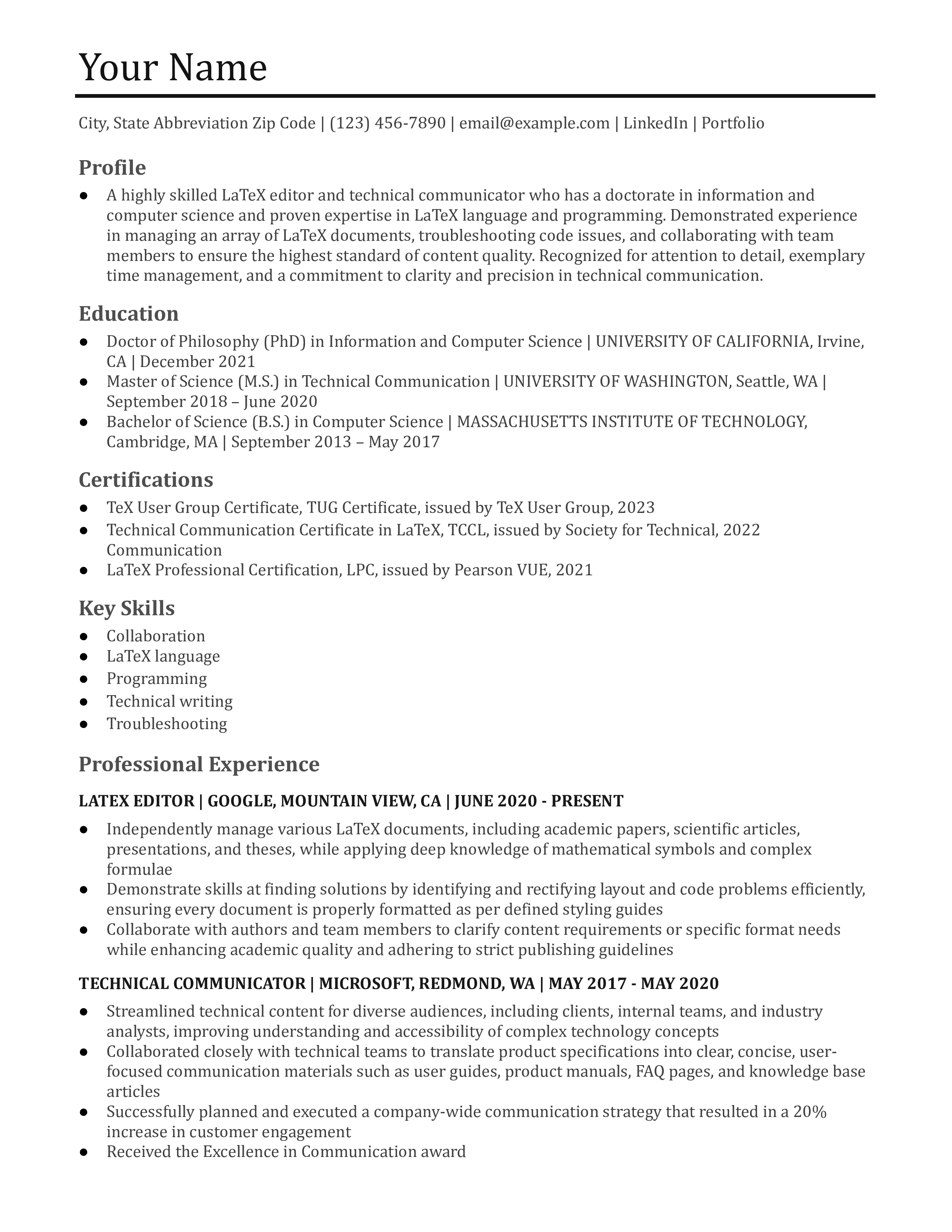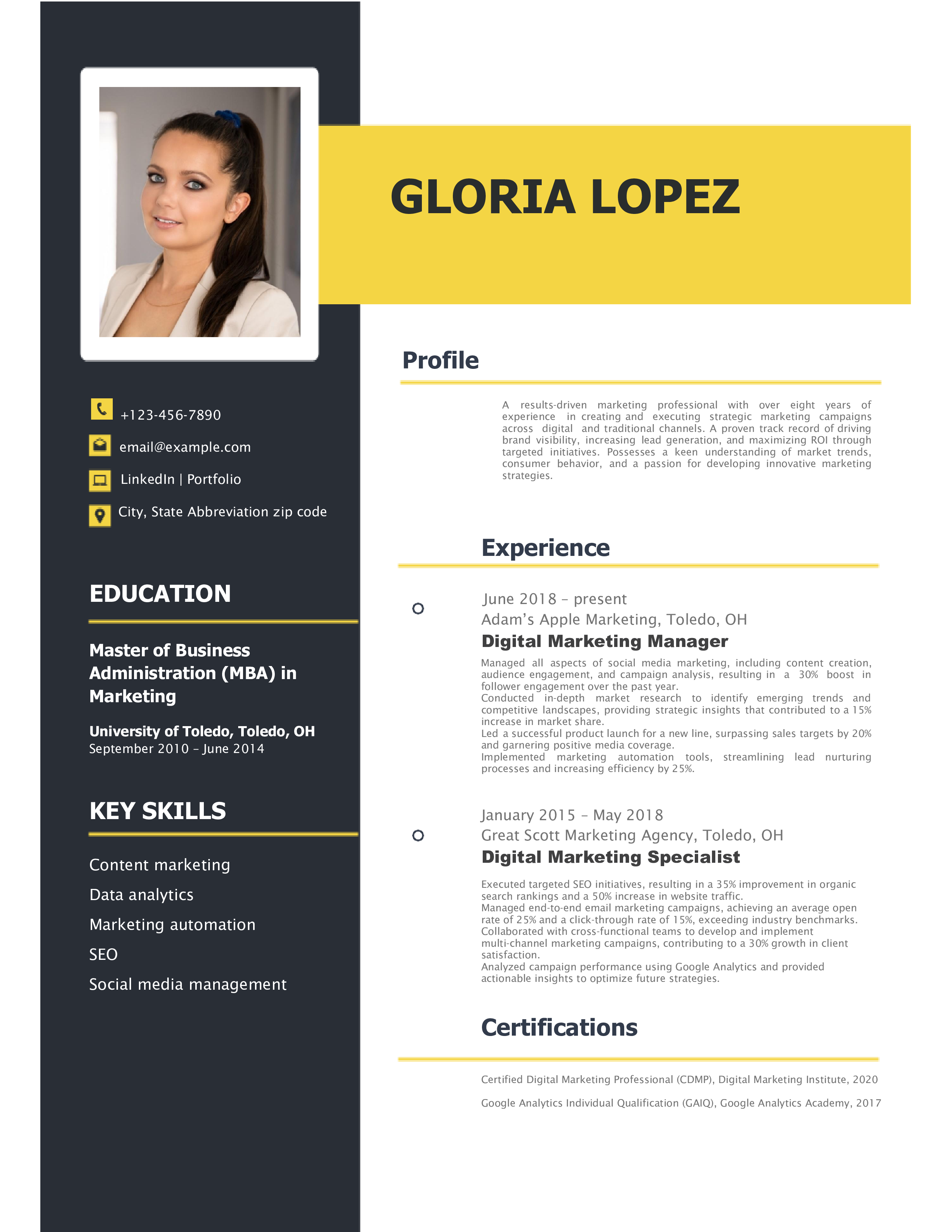Editor Resume Examples and Templates (Downloadable)
- Entry-Level Editor
- Mid-Level Editor
- Senior-Level Editor
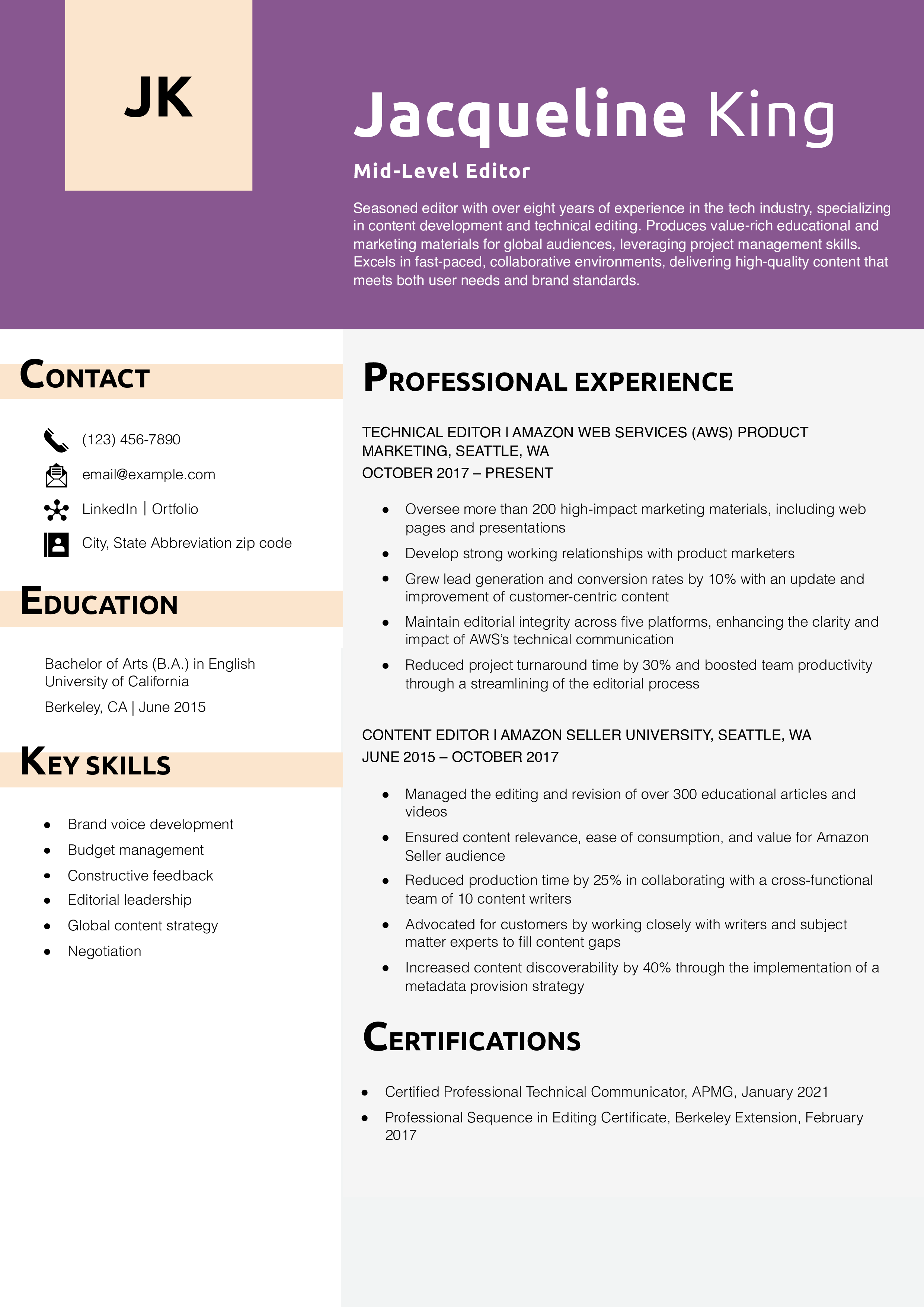
Your editor resume should reflect a deep understanding of the written word and demonstrate an ability to collaborate with writers. It must emphasize good editorial judgment and adaptability to different writing styles and formats. This guide offers strategies and examples to help you write a resume that proves your editorial expertise.
Key takeaways:
- Highlight editing specialization: Begin your resume with the most important and compelling information that reveals who you are as an editor, including details about which industry you’re most familiar with.
- Use numbers to detail achievements: Quantifying your success by describing things like increases in readership or improvements in content engagement will illustrate the impact of your editorial work.
- Include job-specific keywords: To get past applicant tracking systems (ATS), include keywords from the job description throughout your resume that match up with your own editing skills.
How To Write a Editor Resume Example
If you want your resume to have a professional, put-together look, use a modern template to organize your information. Be sure your editor resume includes these sections:
- Contact information
- Profile
- Key skills
- Professional experience
- Education and certifications
1. Share your contact information
Provide all of your contact information at the top of your editor resume in a simple header. List your full name, email address, location, and links to your online professional profile and portfolio of writing samples. Double-check your info so you don’t miss out on a job opportunity due to a broken link or mistyped phone number.
Example
Your Name
(123) 456-7890
[email protected]
City, State Abbreviation Zip Code
LinkedIn | Portfolio
2. Craft an excellent profile with a summary of your editor qualifications
Your resume profile is the hook that draws in the hiring manager, giving them a glimpse of your narrative arc in the field. Distill your career into a few compelling sentences, listing your job title, years of experience, and strengths or specializations. Be sure to include keywords from the job ad to catch the reader’s eye and emphasize your suitability for the role.
Also, include any notable achievements or certifications that can set you apart. For example, suppose you led a major publication overhaul, managed a large team, or specialized in a niche market. Those key details should be mentioned here at the beginning of your resume to lead with the strongest aspects of your editorial career.
Senior-Level Profile Example
Accomplished executive editor with a master’s in communication and a 10-year background in comic book and digital publishing. Strong collaborator who works closely with marketing and sales teams for maximum visibility. Leads innovative content strategies that resonate with the target audience. Prioritizes global reach through strategic international partnerships.
Entry-Level Profile Example
Eager junior copy editor with nearly two years of experience in an editorial position, optimizing digital content across web and social media platforms. Quick learner who excels in refining web content to meet the expectations of leadership. Equipped with a Google Analytics Certification, a bachelor’s degree in English, and an in-depth understanding of search engine optimization (SEO) practices.
3. Showcase your editor experience
The professional experience section is the heart of your editor resume. It should provide a detailed account of your past responsibilities and editorial achievements. Create bullet points under each previous position to describe the scope of your work and give context to your key skills. Use numbers to measure the scale of your accomplishments when possible.
As an editor, you constantly collaborate with others to create and refine content. Remember to add details about your ability to collaborate with team members who may work in departments such as marketing and design.
Senior-Level Professional Experience Example
Executive Editor, TOON Bank, New York, NY
April 2021 – present
- Direct the annual release of approximately 25 children’s comic book titles from manuscript to final production
- Coordinate with marketing team to develop promotional materials for pre-order sales and major releases
- Boosted digital sales by 30% within the first year through a push for e-book availability
- Develop strong relationships with authors and agents to maintain portfolio growth
- Negotiated contracts with 10 international contributors in 2023 to expand TOON’s global presence
Entry-Level Professional Experience Example
Junior Copy Editor, Adobe Systems, San Jose, CA
July 2023 – present
- Edit and optimize approximately 3,000 words per day to improve content readability
- Ensure all marketing materials and web content meet Adobe’s standards, the company style guide, and AP style best practices
- Collaborate with 25 content creators each week by providing constructive feedback and editorial support
- Maintain a high level of detail and accuracy in a deadline-driven, fast-paced environment
- Increased web traffic by 10% in 2023 with the redesign and optimization of Adobe’s website metadata
Resume writer’s tip: Quantify your experience
To join the nearly 100,000 working editors, you’ll need to prove to employers you can achieve similar or even better results. Use percentages, dollar amounts, and other metrics to illustrate the accomplishments listed in your professional experience section. Demonstrate the value hiring managers stand to gain if they bring you onto their team.
Do
- “Grew lead generation and conversion rates by 10% with an update and improvement of customer-centric content.”
Don’t
- “I’m responsible for updating and improving content to increase conversion rates.”
Resume writer’s tip: Tailor your resume for each application
Just like every publication follows its own specifications, your editor resume should show you meet the specific requirements of the job. One way to do this is by tailoring your resume for every position you apply for, using keywords from the job description. This makes it easier for your document to make it through an ATS program.
For instance, if you see the phrase “content strategy development” in the job ad and you have experience with this, include that specific string of words in your resume. The goal isn’t to copy the job description word-for-word but to demonstrate that your skills and qualifications align with the needs of employers.
What if you don’t have experience?
You may not have officially held the title of “editor,” but you’ve likely performed similar tasks. Highlighting transferable skills and pulling from related experience is the best strategy. Perhaps you’ve proofread papers for classmates, managed a blog, or collaborated on a newsletter. While these may not have been jobs per se, they demonstrate valuable related skills.
If you majored in English or journalism, elaborate on relevant coursework and school projects. Also, consider any extracurricular activities. Did you edit your school’s newspaper? Did you volunteer or complete an editorial internship? Describe these experiences on your resume.
4. Outline your education and editor-related certifications
Most employers are looking for editors with at least a four-year degree in a related major like communications or journalism. Regardless of your level of education, always list your highest degree first, followed by any relevant coursework or academic achievements. If you’ve earned any industry-specific certifications or skill specializations, include that information as well.
Education
Template:
[Degree Name]
[School Name], [City, State Abbreviation] | [Graduation Year]
Example:
Bachelor of Arts (B.A.) in English
University of California, Berkeley, CA | June 2015
Education
Template:
[Certification Name], [Awarding Organization], [Completion Year]
Examples:
Professional Sequence in Editing Certificate, Berkeley Extension, 2017
5. Outline your most useful editor skills and proficiencies
Your resume would likely be pages long if you wrote down all of your editing skills. So, which ones should be on your list? First and foremost, understand what the hiring manager is looking for. Match up your own editing skills with those given by the employer in the job description, then add on any more abilities you think would be relevant to the role. For example:
| Key Skills and Proficiencies | |
|---|---|
| Adaptability | Associated Press (AP) style |
| Collaboration | Conflict resolution |
| Content management systems (CMS) | Copyediting and copywriting |
| Creativity | Cultural awareness |
| Google Workspace | HTML/CSS basics |
| Journalism | Leadership |
| Microsoft Office | Modern Language Association (MLA) style |
| Negotiation | Organization |
| Project management | Publishing |
| SEO | Time management |
Resume writer’s tip: Use descriptive action verbs
As an editor, you know how important action verbs are when creating compelling copy. Use these words to transform mundane, long-winded descriptions into concise statements. The best place for action verbs is in your professional experience section. Start each bullet point with a verb to convey your active role in past positions. Consider using some of the words below in your editor resume:
| Action Verbs | |
|---|---|
| Analyzed | Collaborated |
| Coordinated | Crafted |
| Curated | Developed |
| Edited | Finalized |
| Implemented | Improved |
| Mentored | Organized |
| Proofread | Refined |
| Revised | |
How To Pick the Best Editor Resume Template
While choosing a stylish template design is fun, prioritize clarity and readability over visual appeal. When presenting content, it’s vital to make things easy to read and navigate. Hiring managers should be able to quickly scan your document and find everything they need. Classic fonts, a spacious layout, and simple colors are the best ways to make the right impression.
Editor Text-Only Resume Examples and Templates
Judith Hernandez
(123) 456-7890
[email protected]
City, State Abbreviation zip code
LinkedIn | Portfolio
Profile
Eager junior copy editor with nearly two years of experience in an editorial position, optimizing digital content across web and social media platforms. Quick learner who excels in refining web content to meet the expectations of leadership. Equipped with a Google Analytics Certification, a bachelor’s degree in English, and an in-depth understanding of SEO practices.
Key Skills
- Attention to detail
- Content management
- Copy editing and proofreading
- Creative thinking
- Effective communication
- SEO optimization
Professional Experience
Junior Copy Editor, Adobe Systems, San Jose, CA
July 2023 – present
- Edit and optimize approximately 3,000 words per day to improve content readability
- Ensure all marketing materials and web content meet Adobe’s standards, the company style guide, and AP style best practices
- Collaborate with 25 content creators each week by providing constructive feedback and editorial support
- Maintain a high level of detail and accuracy in a deadline-driven, fast-paced environment
- Increased web traffic by 10% in 2023 with the redesign and optimization of Adobe’s website metadata
Editorial Intern, Columbia Journalism Review, New York, NY
January 2023 – June 2023
- Supported the editorial process for over 50 feature articles during internship period
- Maintained and updated the publication’s content archives for reference and research purposes
- Helped increase Columbia’s X platform followers by 5,000 through a targeted active engagement campaign
- Collaborated with 20 different journalists, editors, and experts on content contributions
- Contributed to the development of new content ideas and editorial calendars during senior editor meetings
Education
Bachelor of Arts (B.A.) in English, June 2023
Columbia University, New York, NY
Certifications
- Google Analytics Certification, Google, 2023
Frequently Asked Questions: Editor Resume Examples and Advice
How do you align your resume with an editor job description?
Employment for editors is projected to decline over the next decade, increasing competition in an already competitive job market. To land your dream job, put those editing skills to use and tailor your resume for each application.
Think of the job ad as a style guide of sorts. It informs you of the organization’s culture, values, and needs. Just like you would fine-tune a piece to suit a specific publication’s style and readership, incorporate keywords and language from the job description into your resume.
What is the best editor resume format?
Blending the best of the functional and chronological resumes, the combination format is a great choice for editors. No matter your experience level, this style features both a list of your most relevant skills and a progressive outline of your editorial work history. This healthy balance makes it easy for hiring managers to visualize your editing abilities and the arc of your career.
Include a cover letter with your resume
Highlight your editorial expertise even further with a well-tailored cover letter. Before submitting your application, draft a narrative to accompany the metrics and bullet points of your resume. A cover letter brings hiring managers deeper into your professional story. It’s your chance to create a personal connection that provides evidence for why you’re the best editor for the job.
Check Out Related Examples
Resume Templates offers free, HR approved resume templates to help you create a professional resume in minutes. Choose from several template options and even pre-populate a resume from your profile.

